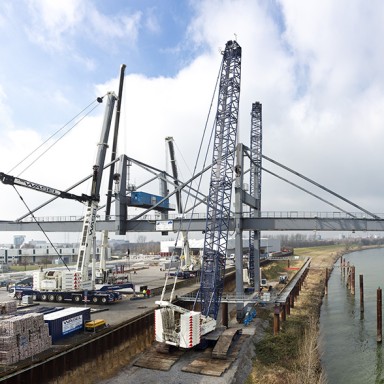 Mobile and crawler cranes
Mobile and crawler cranes
5 minutes | magazine 02/2019
Now even more powerful – the LTM 1750-9.1 gets an 800t upgrade
The nine-axle LTM 1750-9.1 mobile crane can now hoist even heavier loads. The use of refined static calculation methods means that lifting capacity values have been increased across almost the entire working range. This has converted the crane into an 800-tonne machine. The model name LTM 1750-9.1 will stay the same.

Holger Schilke
Refined calculation models:
The wide-ranging experience that the design engineers and structural engineers have with thin-walled boom sections has enabled the popular calculation models and approaches of the finite element method to be further refined. Supported by high performance computers, the real load-bearing structure of the crane is simulated even better in the static calculation model. This makes new findings and methods possible which can be used in the development of new cranes. For example, for the LTM 1650-8.1, which was unveiled for the first time at the Bauma event. However, these new findings can also be transferred to existing cranes such as the LTM 1750-9.1. The most recent calculation standards have also been taken into consideration. As a result, the lifting capacities of the 750-tonne crane are significantly higher in most working ranges than those that were calculated at the market launch of the crane in 2012.
The new lifting capacity tables also contain a table with the nominal maximum lifting capacity of 800 tonnes. Owners of the LTM 1750-9.1 can now update the crane software with the new tables and, if necessary, add any additional equipment required.
There is also the fact that the LTM 1750-9.1 has broken into a higher lifting capacity class due to the new luffing jib configuration used for wind power work. So, for example, more than 10 tonnes of additional lifting capacity can be generated for erecting wind turbines on 90 and 100 metre towers. The LTM 1750-9.1 is also significantly more powerful for heavy duty hoists. One example of this is loading transformers into ships with normal working radii of 12 to 16 metres. The additional lifting capacity in these cases exceeds seven tonnes.
Furthermore, lifting capacity tables for three wind speeds are now available for this crane and for all the latest new developments. This delivers significant additional support for customers, both during job planning and in operation.

This video is provided by Google*. When you load this video, your data, including your IP address, is transmitted to Google, and may be stored and processed by Google, also for its own purposes, outside the EU or the EEA and thus in a third country, in particular in the USA**. We have no influence on further data processing by Google.
By clicking on “ACCEPT”, you consent to the data transmission to Google for this video pursuant to Art. 6 para. 1 point a GDPR. If you do not want to consent to each YouTube video individually in the future and want to be able to load them without this blocker, you can also select “Always accept YouTube videos” and thus also consent to the respectively associated data transmissions to Google for all other YouTube videos that you will access on our website in the future.
You can withdraw given consents at any time with effect for the future and thus prevent the further transmission of your data by deselecting the respective service under “Miscellaneous services (optional)” in the settings (later also accessible via the “Privacy Settings” in the footer of our website).
For further information, please refer to our Data Protection Declaration and the Google Privacy Policy.*Google Ireland Limited, Gordon House, Barrow Street, Dublin 4, Ireland; parent company: Google LLC, 1600 Amphitheatre Parkway, Mountain View, CA 94043, USA** Note: The data transfer to the USA associated with the data transmission to Google takes place on the basis of the European Commission’s adequacy decision of 10 July 2023 (EU-U.S. Data Privacy Framework).This article was published in the UpLoad magazine 02 | 2019.



